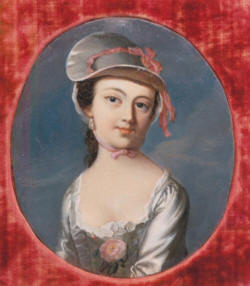

Queer Places:
Père Lachaise Cemetery, 16 Rue du Repos, 75020 Paris, Francia
 Mary Elizabeth Mohl or Mary Elizabeth Clarke (22 February
1793 – 15 May 1883) was a British writer who was known as a
salon hostess in Paris. She was known by her nickname of "Clarkey". She
was admired for her independence and conversation. She eventually married the
orientalist
Julius von Mohl. She was an ardent
Francophile, a feminist, and a close friend of
Florence Nightingale. She wrote about her interest in the history of
women's rights.
Mary Elizabeth Mohl or Mary Elizabeth Clarke (22 February
1793 – 15 May 1883) was a British writer who was known as a
salon hostess in Paris. She was known by her nickname of "Clarkey". She
was admired for her independence and conversation. She eventually married the
orientalist
Julius von Mohl. She was an ardent
Francophile, a feminist, and a close friend of
Florence Nightingale. She wrote about her interest in the history of
women's rights.
Mary Elizabeth Clarke was born in Westminster in 1793.[1] After the death of her father, Charles Clarke, Mary (aged 8), her mother, Elizabeth, and grandmother moved to France and established an intellectual salon in their Parisian home.[2] Their guests were attracted not by their modest hospitality but by the company and the conversation. Mary's skills were almost universally admired and as a result she had a number of notable suitors and important contacts in France and in England.[1] She was on very good terms with Juliette Récamier, who was also the landlady of their sub-let accommodation at the Abbaye-aux-Bois.[3] and a leader in French society. For nearly forty years, the Clarke and later Mohl home was an intellectual centre in Paris.[4]
In 1808 Mary's sister, Eleanor, married John Frewen-Turner M.P. Mary would frequently visit their home in Cold Overton in Leicestershire.[1]
In June 1822, Mary and her mother visited England and Scotland. One of her suitors, Claude Charles Fauriel who became a loyal friend, revealed his interest when he wrote to Mary concerning Auguste Sirey, who had been spoken of as Mary's fiancée. He was concerned as it had been proposed that Sirey would go to England with them.[5] During her relationship with Claude Fauriel, she became acquainted with the family of the famous Italian writer and poet Alessandro Manzoni [6]
In 1838 she made her final move when she rented rooms above the writer and historian François-René de Chateaubriand. These were a third floor apartment at 120 Rue du Bac in the Saint-Germain district.[2] About this time she was introduced to William Nightingale's family including his daughter Florence Nightingale. Florence Nightingale recorded that "Clarkey" was a stimulating hostess who did not care for her appearance and although her ideas might not always agree with her guests, "she was incapable of boring anyone." Her behaviour was said to be exasperating and eccentric and she was clear that she had no respect for British women who she regarded generally as inconsequential. She said that if given the choice between being a woman or a galley slave then she would choose the freedom of the galleys.[4] She generally avoided female company and spent her time with male intellectuals like Fauriel and Mohl. However Clarkey made exceptions including George Eliot, Lady Augusta Stanley, Mrs Gaskell[1] and Florence Nightingale in particular. She and Florence were to remain close friends for 40 years despite their 27-year age difference. Mohl demonstrated that women could be equals to men, an idea that Florence had not obtained from her mother.[4]
In 1847, around 54 years old, she married the orientalist Julius von Mohl who was the son of the Prime Minister to the King of Württemberg.[7] It was said that someone coughed when she gave her age at the marriage and that it was recorded as 39.[1] (The groom was about 47.)
In 1854, Florence Nightingale set off with a team of women to assist in nursing the wounded men from the Crimean War in Scutari. Nightingale's studies had been assisted by Mary and her husband and they again assisted Nightingale when she travelled through Paris en route to the Crimea.[1]
A portion of Wives and Daughters was written by Elizabeth Gaskell whilst staying with Mohl.[1] Mohl herself wrote Madame Récamier, with a Sketch of the History of Society in France (London, 1862).[8] This book drew on her knowledge of Récamier, but it also outlined her interest in women and a history of their rights.[1]
In 1870–71, Mohl decided to avoid France's war with Prussia and she spent the winter with friends in London. Mohl died in Paris in 1883 having retired from being a hostess. She was a lifelong advocate for women and reading. She was buried with her husband in Paris in the Pere Lachaise cemetery.[1][2]
My published books: